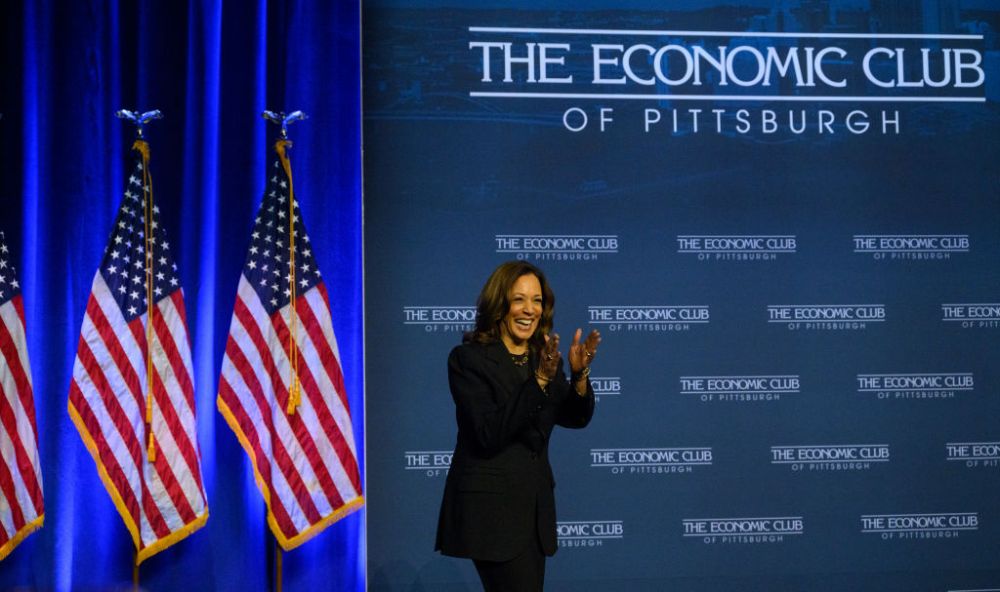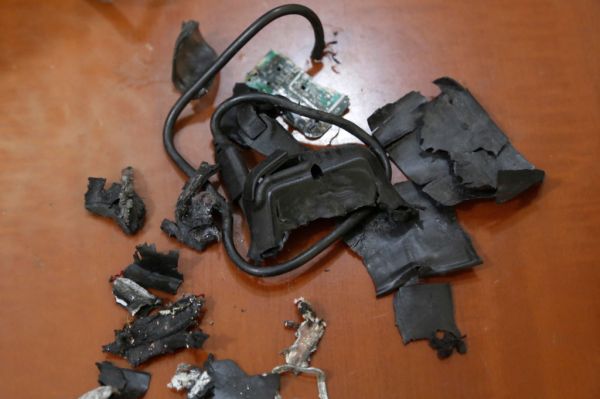Dear Reader (except for those of you body shaming the bears),
Earlier this week Kamala Harris laid out her economic vision, or something. At Carnegie Mellon University in Pittsburgh, she said:
As president, I will be grounded in my fundamental values of fairness, dignity, and opportunity. And I promise you, I will be pragmatic in my approach. I will engage in what Franklin Roosevelt called “bold, persistent experimentation.” Because I believe we shouldn’t be constrained by ideology and, instead, should seek practical solutions to problems, realistic assessments of what is working and what is not, applying metrics to our analysis, applying facts to our analysis, and stay focused, then, not only on the crises at hand but on our big goals, on what’s best for America over the long term.
Now, I’ll speak plainly. I don’t believe her. But I’ll get to that.
First, let’s discuss this “bold, persistent experimentation” thing. There are few supposedly glorious lines from American civic history that annoy me more than this. It comes from FDR’s Oglethorpe University Commencement Address in 1932. Then-presidential candidate Roosevelt said:
The country needs and, unless I mistake its temper, the country demands bold, persistent experimentation. It is common sense to take a method and try it: If it fails, admit it frankly and try another. But above all, try something. The millions who are in want will not stand by silently forever while the things to satisfy their needs are within easy reach.
Now, as political boilerplate amid of a deep and lasting depression, I think this was forgivable campaign rhetoric. The problem is that progressives have made this bold, persistent experimentation thing into a kind of catechism for their governing philosophy. And it’s garbage.
If a doctor were stumped about why you had a seething pain behind your right eye, I doubt you would be all that reassured if he said, “Huh. I’m out of ideas for what this could be. Let’s try some bold persistent experimentation and see what works. Let me get my drill.”
The role of government is not to conduct a science experiment with people’s lives and livelihoods. The scientific method is great, but it’s great at science. Like in a lab, with petri dishes full of flan or lab animals. But citizens—and, yeah, taxpayers—aren’t spores or pink-eyed rats.
Every dollar the government spends on one “experiment” that doesn’t work is a dollar it could have spent on something that does work. Or a dollar it could have left in the pockets of the people who earned that money in the first place. Or a dollar it could have used to pay down the national debt. There are lots of better uses for dollars out there than bold experiments. Don’t get me wrong, I’m not a fanatic on this point. Of course there’s room for some pilot programs and government investment. But that has never been the spirit in which that catechism is offered.
FDR was famously borrowing language from American philosophical pragmatism. And that school of thought held that ideological constraints on the freedom of action of experts were folly. Why should the Constitution or the law restrain the government during a crisis? The experts know what to do better than the politicians, and if they don’t know what to do, let them experiment!
In other words this “experimentation” thing was always an argument for power, not principle. This is my lasting beef with philosophical pragmatism in a nutshell. (I’m holding a nutshell full of beef right now, but you can’t see it.) Pragmatists used their “method” to attack competing sources of authority and “abstract” or antique constraints on their power. “Oh your fusty and dusty ideas about the Constitution or ‘free-market principles’ are dogmatic and hidebound. We’re willing to break with tradition. Don’t tell us this has never been done or that it can’t work! We’re not ideologues! We’re experimenting here!”
People know I am a fan of the idea—not coined by me—that behind every double standard is an unspoken single standard. Well, the single standard behind all of the experimenters and pragmatists going back a century now is that all of the experiments should involve more government. If these guys were the open-minded, “no idea is too crazy,” freethinkers they claim to be, something close to half of their ideas would be about closing government agencies, privatizing various functions, cutting subsidies, and clearing away red tape. But it sure seems like the vast majority of these experiments—outside of drug legalization and defunding the police—always involve more regulations, more government spending, more government workers.
FDR was pro-union. But he thought unionizing government employees was a mad idea, calling them “unthinkable and intolerable.” Tell me, where is the spirit of boldness and the courage to think outside of the box when it comes to teachers’ unions?
The most obvious way you can tell a lot of this stuff was simply an effort to clear the field of competing ideologies is to ask: Where are all of these frank admissions of failure I keep hearing about? If the point is to boldly experiment, then failure—and admitting failure—is essential. But we get a lot of Shatner-esque pronouncements about bold new initiatives and not very many frank admissions of failure.
One explanation for this century-long failure to admit failures is that this was never really about experimentation. But there are a bunch of others. It turns out that even people who brag about their disinterested commitment to follow the facts and data with robot-like dedication are, in reality, human beings. And human beings don’t like to admit their pet projects and ideological fixations are wrong. Intellectuals and activists become invested in their causes (for instance, I think it will be a while before, say, political adviser Oren Cass stops fighting with pretty much every economist out there over tariffs). The more human response from all of these fake pragmatists is to say, “Real X was never tried!” Or, “If we only funded it properly it would have worked!”
And then there’s politics. Even if this stupid analogy makes it sound like experimentation is cost-free and always beneficial, politicians actually know that I’m right about the scarcity of resources. No politician wants to say, “Well, we really thought this gazillion dollar high speed rail system would work. Oy, were we wrong. Oh well, let’s move onto the next hugely expensive experiment paid for with your tax dollars!”
Every Democratic president since FDR has tried to cosplay FDR to one extent or another, and I’m pretty sure they’ve all quoted this “bold, persistent experimentation” line. They’ve certainly all invoked its spirit. Off the top of my head I can only recall two instances of Democratic presidents have come close to frankly admitting error: Bill Clinton declaring “the era of big government is over” and Barack Obama admitting to the New York Times that his whole “shovel-ready jobs” thing was wrong.
I mean this sincerely: Good for Obama for admitting that. But tell me, how many Democrats have scratched the idea of shovel-ready jobs off their ideological lists, and how many have just scratched the slogan off their lists? I see no evidence that Joe Biden—Obama’s vice president—learned any important lessons along these lines that he applied during his presidency. And I don’t see any evidence that the Democratic Party has either, except again, for the need to avoid saying that phrase until people forget and they can try again.
That’s why I don’t believe Kamala Harris when she says her priority is to apply “facts” and “metrics” to her analysis and to stay loyal to the spirit of experimentation. Politicians have been saying this stuff for a century. And it’s always been bunk.
Various & Sundry
You may not know this, but there are six U.S. state capitals west of Los Angeles. But that’s not important right now. What is important is that we’re running a program to provide subscriptions to The Dispatch for college students. Given all of the rage-click stuff out there on the left and the right, we think The Dispatch is a great resource and safe haven for reliable information and nonpartisan journalism. Sponsor a student subscription here.
Canine Update: I don’t have too much to report because I’ve been away from home, where it sounds like things are going well. Zoë seemed to be getting better before I left. But she does have more low-energy days more often than we would like. Hopefully the fall weather will help. Zoë is taking her pack protection responsibilities more seriously these days (while Pippa is thinking deep thoughts). Gracie is a sweetheart. Chester is a pill. And Penny is a doll. She’s been interning at the Dispatch office and she’s understandably very, very popular.
The Dispawtch

Owner’s Name: Sharon Peterson
Why I’m a Dispatch Member: Jonah and Steve have always been the ones I turned to for a reasonable take on whatever was going on. So when they created an island of sanity in a world gone crazy, I was in from the beginning. Kevin coming over was pure lagniappe. That’s why I joined. I stay because The Dispatch has assembled not just the most interesting and thought-provoking opinion writers anywhere, but also, with The Morning Dispatch, the most factual, well-informed news team in the business.
Pet’s Name: Sam
Pet’s Breed: Labrador Retriever
Pet’s Age: 6
Gotcha Story: Several years ago, we retired to a small ranch in the Texas Hill Country, bringing with us our previous, mature, calm, well-trained Labrador Retriever. We lost him way too early and took a year to be ready for a new dog. Once we started looking, we quickly found that the fencing out here, designed for livestock, was a concern to the Lab rescues we spoke to. So in the end, we decided to get a puppy from a rural breeder and raise him as a ranch dog from the get-go. When the litter was a few weeks old, we went and picked the yellow male with the big feet and the “white” paper collar. While waiting for the pups to get old enough to go to their new homes, the breeder sent us periodic photo updates including a video of the whole litter in a play yard, chasing her young daughters back and forth. Eight puppies, run-stumbling across the yard, and one of them suddenly smashes head-first into a pole. We zoomed in for a closer inspection of that little paper collar, and yep! That’s our boy!
Pet’s Likes: Food. Catching frisbees. Food. Chasing armadillos. Food.
Pet’s Dislikes: Thunder, vultures, and things hitting the roof of the motor home we like to vacation in (we cannot park under oak trees).
Pet’s Proudest Moment: The day he succeeded in getting two Kong toys and a deer antler in his mouth all at the same time.
Moment Someone (Wrongly) Said Pet Was a Bad Dog: The day Sam snuggled up to my elderly mother for a pat and snatched the muffin off the plate on her tray. She wasn’t wrong.







Please note that we at The Dispatch hold ourselves, our work, and our commenters to a higher standard than other places on the internet. We welcome comments that foster genuine debate or discussion—including comments critical of us or our work—but responses that include ad hominem attacks on fellow Dispatch members or are intended to stoke fear and anger may be moderated.
With your membership, you only have the ability to comment on The Morning Dispatch articles. Consider upgrading to join the conversation everywhere.